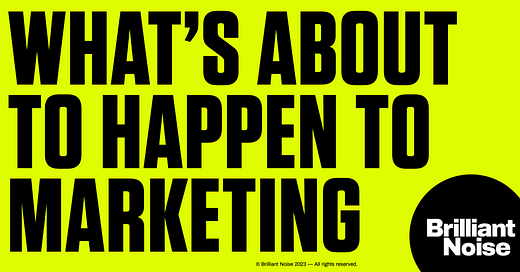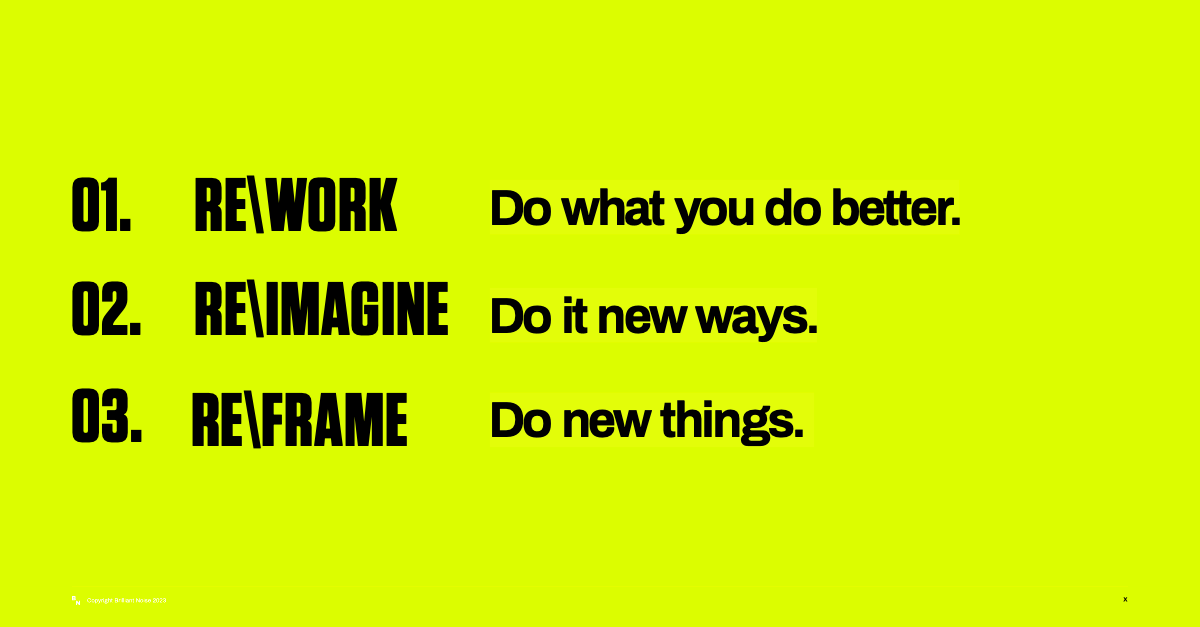Dear Reader
What’s about to happen to marketing? Generative AI will move the cost of content production toward zero, say investors. Meanwhile the “cost of cognition” will be lowered dramatically for all kinds of work, according to Harvard professor Karim R Lakhani.
In our webinar last week, Antony Mayfield shared the Brilliant Noise view of what is about to happen as the AI revolution speeds up.
Watch the whole thing on YouTube by all means, but we’ve also organised this into a Very Short Briefing (VSB) for you.
We will soon be releasing a small number of tickets to a longer online executive briefing. There’s a 50% discount for BN.Edition subscribers – the code is BNED50 – and we’ll remind you when tickets are available. If you want to know more or book a private briefing, contact us at hello@brilliantnoise.com
Shortest briefing (15 seconds)
AI will change the economics of marketing functions. First tasks will be replaced, then workflows will speed up and finally whole systems and business models will be reimagined. Start learning and experimenting as soon as you can.
Short-ish briefing (3 minutes)
We are currently in a "fog of revolution" when it comes to AI and marketing. Things are changing rapidly and it can be confusing. However, marketers need to engage with AI to understand it rather than avoid it due to fear or uncertainty.
There are 3 phases of change that marketing organisations will go through:
Rework: Using AI to do existing marketing tasks faster and better
Reimagine: Rethinking processes and borrowing ideas from other industries impacted by AI.
Reframe: Completely rethinking marketing, including business models
Marketers should look to industries already disrupted by AI like education and law. Lawyers are using AI for tasks like drafting contracts faster.
The cost of content production and distribution is moving towards zero due to AI's ability to repurpose and recreate content quickly.
Marketers need to learn continually, experiment safely, and help their teams skill up. Leaders need to create a culture of learning.In the rework phase, hack days and sharing knowledge are useful. In the reimagine phase, managing experiments and idea pipelines is key.
Overall, marketers need to engage with AI transformation to avoid being average and replaceable.
Summary article (10 minutes)
The pace of change in artificial intelligence over the past year has been staggering. Since the launch of ChatGPT in November 2022, barely a day goes by without a new tool, innovation or concern arising. For marketers, this breakneck speed has created a disorienting "fog of revolution". The landscape seems to shift constantly, making it near impossible to grasp the field's full potential impact on marketing or to strategize effectively.
Uncertainty breeds fear, and many marketers have responded by avoiding engagement with AI altogether. Some organisations have even banned the use of tools like ChatGPT entirely. However, this head-in-the-sand approach is highly risky. As other sectors adopt AI rapidly, from finance to healthcare, marketing risks being left behind.
A wait and see approach may feel prudent but in fact leaves professionals vulnerable to skills obsolescence and organisations open to disruptive competition. Instead, marketers must proactively engage with AI despite the confusing pace of change. Learning, experimenting and upskilling around these emerging technologies will enable both individuals and firms to ride the wave of disruption rather than being swept away.
Content production costs move toward zero
One of the most revolutionary impacts of AI that we highlighted is its potential to drive down the marginal cost of content production and distribution to near-zero. As tools like ChatGPT become capable of generating written content, audio, visuals and more, the expense of creating marketing assets from scratch plummets.Repurposing and recreating content also becomes exponentially faster and easier with the help of these AI systems.
This could be seen as an existential threat for content creators and marketing professionals whose value has historically been deeply linked to their creative output. However, he argues marketers should view it as an empowering opportunity instead. Relieved of the most repetitive, low-value tasks, human marketers can focus on strategy, leadership and maximising the return on assets rather than just making more. Intelligent content distribution through platforms, ads and customer interactions can improve exponentially when humans work in tandem with the personalised, optimised recommendations of AI.
As the marginal cost of routine content creation falls, the potential value to be gained from true marketing innovation and engagement rises, benefitting both brands and customers. But marketers will need to reframe their roles to unlock this opportunity rather than resisting the change.
The three stages of the transformation
A helpful framework for understanding how marketing organisations will evolve their use of AI over time is looking at three phases of how AI will change our work.
The first is "rework" - using AI to improve execution of existing marketing responsibilities. This could involve leveraging tools like ChatGPT to conduct market research, draft content and optimise campaigns faster and better than humans could alone.
The second phase is "reimagine" - rethinking core marketing processes and redesigning workflows. We can learn from other industries already disrupted by AI. Law firms are already training AI to speed up contract drafting for example, and their innovations could inspire marketing teams to redesign their own document creation workflows.
Finally, there is "reframe" - completely reinventing marketing from the ground up, including potential new business models unlocked by the technology. This third phase is difficult to envision, as we remain early in the adoption curve, but holds the biggest transformative potential as marketing learns to "think different".
This framework provides a valuable guide for marketing leaders to assess where their organisation currently stands in its AI integration. It also indicates how adoption strategies and needs will evolve over the years ahead as AI capabilities accelerate rapidly.
We can learn from the legal sector
When considering how to integrate AI into marketing, professionals should look beyond their own industry. Fields like education and law are already being radically transformed by artificial intelligence. In the legal profession for example, AI tools are now routinely deployed to accelerate contract drafting. Lawyers can feed sample documents into programs like Contract Review Tool, which will then analyse the text to extrapolate important clauses, variables, and overall structure. This allows an initial draft to be auto-generated, which lawyers can then refine while avoiding the most tedious parts of the process.
At the “reimagine” phase, a winner of this year’s an FT Innovative Lawyers 2023 shows how careful experimentation and innovation can lead to re-shaping how we think about a type of work. Accenture’s in-house legal team has developed an approach to contracts that uses AI and data to assess the risk in each clause of a contract which helps prioritise how much effort to put into it, as opposed to the checking of every clause and sentence that time-based legal services models still use.
The hours of time saved demonstrate the dramatic productivity gains AI can drive when applied to knowledge work. Observing such impacts in other knowledge work should expand marketers' sense of possibility. If AI can transform how lawyers leverage documents, how might it redefine content production, analysis and distribution in the marketing domain? Rather than reinventing the wheel, marketers should scout adjacent industries and mimic innovations that could also add value in their space.
Learning and experimentation are urgently needed
With marketing undergoing an AI transformation, Mayfield was unequivocal that continual learning is non-negotiable for every professional. He said marketers should proactively develop their personal skills in areas like natural language processing, training machine learning models and leveraging AI tools for business goals. They need to experiment continually with emerging technologies through safe sandboxing and prototyping exercises, while sharing knowledge across teams.However, this culture of learning cannot be driven solely at an individual level. Leadership must also make it a priority across marketing departments and the wider organisation. They should provide resources for team training and development, create spaces for exploration like hackathons and innovation labs, and incentivize sharing experiment insights across silos.
Most importantly, leaders themselves need to role model balanced eagerness to learn alongside prudent scepticism regarding AI's limitations and risks. If the CMO and CEO fail to engage with AI as more than hype, underinvest in capability building, and rely solely on external vendor solutions, their organisation's marketing function will quickly be left behind. In contrast, leaders who foster a learning culture will gain talent with cutting-edge skills, differentiate from competitors, and position marketing to not just survive but thrive in the age of artificial intelligence.
Where to start?
For the initial “rework” phase, we recommend activities like hack days and knowledge sharing sessions to build foundational skills. These hands-on learning experiences enable teams to get comfortable with new tools and explore how AI could enhance day-to-day work.
As organisations then progress to the “reimagine” phase, the key priority should be managing the influx of experiments and ideas in a structured way. For example, marketing leaders could create centralised repositories to track AI testing across the department.
They could also establish governance processes, like innovation pipelines and stage-gates, to funnel the most promising use cases towards production. Without robust systems to handle the proliferation of AI experiments, organisations risk wasted resources, duplicated efforts, and failure to scale any solution. Marketing leaders who build the infrastructure to test rigorously and scale thoughtfully will remain ahead of the pack.
Ask for help
Get in touch with us to find out how we can help your team or organisation start to adapt.
Many thanks for reading,
The Brilliant Noise team







